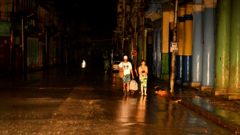This website uses cookies so that we can provide you with the best user experience possible. Cookie information is stored in your browser and performs functions such as recognising you when you return to our website and helping our team to understand which sections of the website you find most interesting and useful.


Officials in Cuba have begun restoring power after the country suffered a nationwide blackout on Wednesday caused by Hurricane Rafael, the country's president says.
Hurricane Rafael brought strong winds of up to 185km/h (115mph), causing a shutdown of the country's electricity system for the second time in just weeks.
At least 70,000 people were evacuated from their homes before the storm made landfall on Wednesday with warnings of storm surges, flash flooding, and mudslides.
No fatalities have been reported.
President Miguel Díaz-Canel said the provinces of Artemisa and Mayabeque as well as the capital Havana were severely hit.
"Every step from this point forward is geared towards recovery. Together we will do it," he added.
Th western parts of the country saw widespread flooding and damage to properties brought on by the hurricane. Most of the country's 10 million population are still without power.
In Havana, residents used shovels, brooms and buckets to clear rubbish, mud and branches as they assessed the damage on Thursday.
Fallen electricity pylons lined the motorway from the capital's west to Artemisa, and towns along the route were strewn with branches and debris from damaged homes.
One Artemisa resident said people were having to "improvise" to deal with the power cuts.
"If you don't have gas, you have to improvise with coal," Elias Perez said.
"Yesterday my wife and I got by with coal. It's a mess, but we have to keep going."
Last month, millions in Cuba were left without power for four days after issues with the country's old energy infrastructure caused a blackout.
That blackout also coincided with Hurricane Oscar, a less powerful category one storm that left a trail of destruction along the island's north-eastern coast.
Natalia Martinez, also from Artemisa, said: "We know how to survive, we're in the dark all the time, you know."



 Africana55 Radio
Africana55 Radio 
